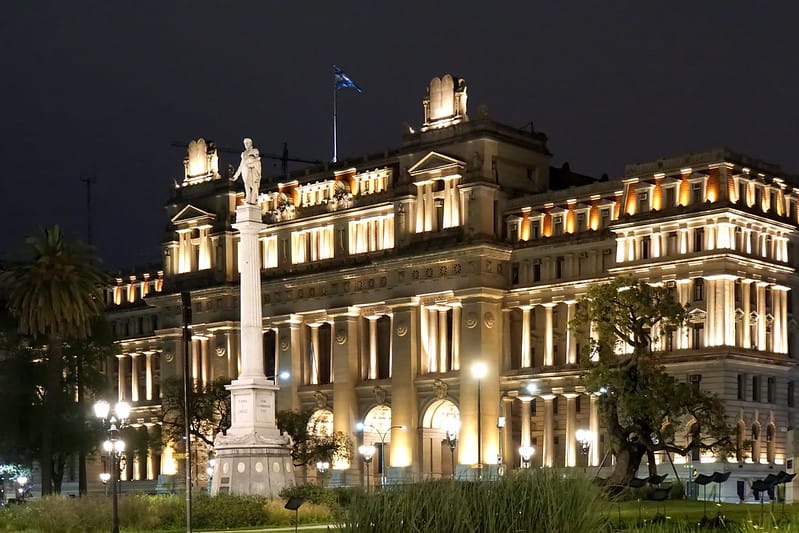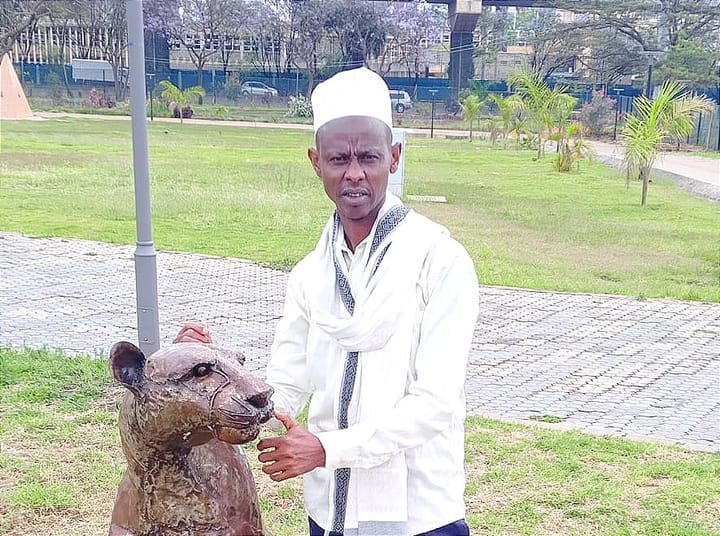How judges benefit from Argentina's novel green education law

Yolanda Benjamina Ortiz was an Argentinian chemist born in 1926, who started her professional life working at Shell and then moved into the civil service.
Ortiz was made Argentina’s first environment secretary in 1973 by Juan Perón, following his exile in Spain. She believed in the inextricable connection between environmental and economic issues, saying that a “mental revolution is necessary and urgent” to improve society’s relationship with nature, and is still held in very high regard.
In the year Ortiz celebrated her 90th birthday, an NGO was set up in Argentina called Ecohouse which initially focused on environmental education but later shifted into politics.
In 2019, just before the Covid pandemic, Ecohouse started to meet with legislators from across the political spectrum to discuss a problem it had keyed in on: that environmental education in Argentina simply “wasn’t happening”.
“We were very clear that we had to do something,” Maria Aguilar, Ecohouse’s director of education, tells The Wave.
At one meeting at Ecohouse’s office with politician Camila Crescimbeni, a plan formed to require everyone in a public office to learn about key environmental issues. “Everything happened in this conversation,” says Aguilar.
Trying to get everyone on board with the idea was difficult. “We had lots, lots, lots of meetings with different politicians from different parties, trying to activate this,” says Aguilar. “No one was against it, but it was always political issues in the middle.” Nonetheless the idea gathered steam, with NGOS, universities and youth activists in support and a media campaign behind it.
"You need to make sure that environmental education gets to every sector of society, not only to children"
UNESCO has been hot on environmental education, saying it should be a core component of curricula around the world by 2025, and around the same time Argentina developed a parallel law requiring environmental education in schools, universities and other public institutions.
But Aguilar says this new law was special. “You need to make sure that environmental education gets to every sector of society, not only to children. It’s always thought about in that sense, but it’s not enough because we can’t wait for those kids to grow up.”
Julio Díaz, secretary of the federal criminal court No. 1 of La Plata, said environmental training is of “vital importance” to the judiciary because it raises awareness of the complexity of environmental issues, helps people see themselves as part of the environment, and warns that there are common and differentiated responsibilities in the impacts that man has on nature.
Two female senators from different parts of Argentina’s political space started working together to get the law passed. Senator María Eugenia Catalfamo, from the Frente de Todos coalition, put forward a bill and a few days later a similar initiative was introduced in the Upper House by Gladys González from another coalition called Juntos por el Cambio. “That was amazing,” says Aguilar. “They became sort of friends.”
The bill went through the Argentinian parliament and was finally approved, nearly unanimously, in December 2020.
The law requires all public officials, whether in the executive, legislature or judiciary, to be trained in environmental and climate change issues. It was named ‘La Ley Yolanda’, or ‘Yolanda’s Law’ in honour of Ortiz, and as far as those involved are aware it was the first law of its kind in the world.
I’ve written before about judges in some jurisdictions receiving special training to help them navigate climate lawsuits, and a group of California judges recently emphasised how serious this need is. Even the International Court of Justice recently met with scientists from the Intergovernmental Panel on Climate Change to "enhance" its understanding of the organisation's findings.
But it’s also a topic that has attracted a backlash with accusations that it is an “insidious threat” to the judicial system which is creating a “bias” against the fossil fuel industry. The Guardian recently reported that a right-wing organisation connected to Leonard Leo appears to be behind a lot of this.
This was not a major stumbling block in Argentina, where an official guide to the law describes it as a “milestone”: “The approval of this law not only crystallized a specific moment in our country and its actors, but also the entire extensive and powerful tradition of historical struggles and achievements of environmentalism in Argentina.”
The guide, which includes an intimate foreword by a friend of Ortiz, says the law is strategic, both seeking to tackle urgent issues and with a long-term political goal. “In short, it seeks to ensure that this perspective is taken into account when thinking, planning and implementing programs and actions from state institutions.”
Aguilar says the passing of La Ley Yolanda was great, but only the start of the challenge. “Argentina has lots of really, really good environmental laws that are very hard to implement. Most of them do not happen in real life.”
The government consulted on how the law should be implemented. Aguilar notes that most of those that took part initially were from agricultural organisations as well as some oil firms. “In Argentina, agriculture is the basis of our economy. They were very careful about what was going to be said and that there was nothing that's going to go against agriculture.”
The government realised it had a problem and approached Ecohouse asking for more environmental support. “There were very committed people at that moment trying to move this implementation on the right way - luckily,” says Aguilar.
Don't lie for me Argentina
Eventually what was agreed was that participants must chalk up 16 hours over six compulsory and two optional modules covering subjects including biodiversity and ecosystems, climate change, circular economy and sustainable development.
According to the guide the “information included must be clear, precise and scientifically based, and must be adjusted to the agency and the context in which it is provided”. People who don’t do the training can be fined, and even publicly shamed online.
Ecohouse did not think the central government’s training scheme, which consisted of videos and some required reading, was good enough. So it developed its own with actual classes where participants could interact and ask questions, which the government validated.
Aguilar praises the teams working on the implementation of Yolanda and its sister environment education law. “They were very, very good. They were not political, they were technical, and they were very keen on working with us, because they know that the parties can change, but civil society is permanent.”
Provinces had to individually adopt the law (all but one have done so) and could design their own guidelines. Aguilar says Buenos Aires is usually one of the more progressive provinces, but its Yolanda Law only required three modules of 45 minutes each. “They asked us: ‘What do you think about it?’ And I was like: ‘Are you kidding? This is shorter than the Titanic movie.’” By contrast, Chaco, which has some of the worst deforestation rates in the world, tried to put in place an ambitious programme.
One key aspect of the law is that it applies to everyone - from the lowliest civil servant to the country’s highest office. When then president Alberto Fernández undertook his training in 2022 he put out a press release about it.
“Everything was moving forward pretty fast for a law approved in 2020,” says Aguilar. “Yolanda had its website, and you could see how many people had undertaken a course, both with us or with the government.”
And then everything changed.
In 2023, Argentina elected Javier Milei, a climate denier who rejects deforestation policies and who is now considering following the US in withdrawing from the Paris Agreement.
Although there is still a page about Yolanda’s Law on the Argentinian government website, many details have disappeared. “You cannot download any documents regarding the law, the syllabus, nothing,” says Aguilar. “They are not promoting anyone to undertake that. I've been mailing since this new team started, and you never know who to write to, because no one is there. At first we said, ‘Okay, let's give them some time.’" But over a year has now passed.

Nonetheless, training of the judiciary in particular has continued, with a programme that lasted the whole of last year. It covers key scientific and legal principles about a swathe of local and global environmental issues. On climate, the course goes into detail about mitigation and adaptation, energy systems and how domestic and international laws play into these. One section explains the Escazú Agreement.
Díaz says the content of the course is truly innovative because most people working in the judiciary have not had any training in environmental matters; “much less in sustainability in their undergraduate courses”.
The Wave was told that more than 7,000 people have been trained under this programme including judges, chamber members, secretaries, students and other personnel within the justice service.
"From the records and returns that I have had from colleagues in the judicial office, and many others in the jurisdiction where I work, I can say that the contribution is significant and of enormous relevance for the daily work in the management of a case that has an environmental conflict as its object," says Díaz. "With this training, a set of management tools is being provided, both to arrange judicial proceedings within a file, as well as to carry out specific acts in the affected environment."
He adds that the training contributes to "better management of judicialised environmental conflicts".
This is happening even though no-one appears to be centrally enforcing or tracking La Ley Yolanda, or publicly shaming those who haven’t done what it requires. Queries from The Wave to an official email address go unanswered and there is no environment department to pursue.
Whether La Ley Yolanda will one day achieve the “mental revolution” Ortiz worked for remains to be seen; the goal is now just to keep it alive until the next general election. “It's very sad and very frustrating, but once you understand the game, you have to learn to play and to find allies where you can," says Aguilar.
Aguilar says the campaign did manage to bring together environmental NGOs in Argentina in a way that had not happened before. “When Milei came up, we were so frightened of the future. We took so many steps backwards. Now we have to go back again to the basest discussions that were made years ago.” Milei has gone big on deregulation, trying to ease restrictions on mining near glaciers and removing protections for forests and overseeing a potential collapse in the nation's science. He has also forged ties with other right-wing climate sceptics, making his administration a huge threat both to Argentina's environment and global environmental action. “You find yourself talking about things like ‘Climate change exists, really?’” says Aguilar. "We need to talk about that, yeah."
Ortiz died in June 2019 at the age of 94. I ask Aguilar what she thinks the chemist would have thought of a law named after her, which had so many other women backing it and driving it forward. “I think she would be very, very proud.”
And what about what’s happened since? “She would be depressed. But then, after being depressed and crying, you say: ‘Okay, now I need to work harder than ever.’”



